America Hasn’t Really Noticed, But It’s Election Time In The United Kingdom
Great Britain heads to the polls in less than a week, and it remains unclear just what's going to happen.
It hasn’t received very much attention here in the United States, but there is an election next week in the United Kingdom, and it probably deserves more attention on this side of the pond than it’s been getting:
It’s an election that refuses to play by the rules. The U.K. goes to the polls on May 7 and pollsters are still scrabbling for a reliable forecast – in fact, the calls about “how difficult it is to call” have fast become the cliché of the campaign.
What can be said with certainty is that the traditional two-party dominance that has been a feature of British politics since 1945 has been challenged by a range of insurgent parties. Whatever happens on May 7, the U.K.’s political landscape has altered for good. Here, we take a look at why and how this is happening.
In the 18 general elections since the British public put Labour’s Clement Attlee in power in 1945, U.K. politics has been relatively stable, with the left-wing Labour and the center-right Conservative Party winning 9 each.
Within these governments there were seismic changes: the rise of Thatcherism; the birth of the welfare state under Attlee; near-crippling trade union strikes and the dismantling of the British Empire to name a few. Yet, gradually, both the main parties moved closer to the center ground, and the U.K. became one of the safest havens for investors around the world.
Could that be about to change?
The U.K.’s population has become increasingly disillusioned with the two main parties. Whereas in the 1951 General Election, 95 percent of voters backed either Labour or the Conservatives, this time round polls suggest that around only two-thirds of voters will back the two main parties.
Who’s eroding their vote share? The most prominent disruptor is the U.K. Independence Party, whose leader Nigel Farage is a well-known face on U.S. cable news. Yet they’re likely to win less than a handful of seats.
Much more important to the formation of the next U.K. government: the Scottish National Party (SNP) – the size of their win in Scotland could determine whether Labour can form a government post-May 8. There’s also the Liberal Democrats, currently in government as part of a coalition deal with the Conservatives. And another potential player is Northern Ireland’s Democratic Unionist Party (DUP), the least socially liberal of any of the parties sitting in the U.K.’s House of Parliament.
So why are people turning to these parties?
The two candidates to be the next Prime Minister, incumbent David Cameron and Labour leader Ed Miliband, are both white, brown-haired married fathers in their 40s with degrees in Philosophy, Politics and Economics (PPE) from Oxford, who have spent most of their working lives immersed in Westminster politics.
Despite their attacks on each other’s policies they are, in fact, pretty similar on a lot of the basics. Both are committed to deficit reduction; both plan to build 200,000 houses a year and both want to spend more money on the state health provider, the National Health Service.
So when someone comes along who appears to be more natural, anti-elitist or just expressing different views, whether it be Boris Johnson of the Conservative Party, Farage, or Nicola Sturgeon of the SNP, they instantly seem like a breath of fresh air.
Ultimately, because of the U.K.’s first-past-the-post system, the struggle for power will come down to less than 100 out of the U.K.’s 650 parliamentary seats. It’s these constituencies, that are most vulnerable to a swing away from the incumbent, that have become the focus of relentless campaigning in recent weeks.
As I said, for some reason this year’s British elections seem to be getting much less coverage in the United States than the 2010 elections did. I’m not sure whether that’s because there’s so much else going on in the news over here, or because the beginning of the 2016 Presidential race has political pundits paying more attention to domestic politics than international politics, but there’s definitely been a marked drop off in coverage of British politics here in the U.S. this time around. It’s unfortunate, because from what I’ve been able to follow myself, this is shaping up to be a fairly interesting election.
Most of the recent polling has shown that neither Labour nor the Tories will come anywhere close to the majority that they would need to form a government on their own, and it also suggests that forming a coalition could prove difficult and politically risky for either party. The projections prepared for FiveThirtyEight by a group of British academics largely tracks with the other media projections, although their projection seems to make things tougher for Labour when it comes to forming a government. For Conservatives, a large part of the problem is that, in addition to losing seats on their own, it also looks as their their current coalition partner, the Liberal Democrats, will lose even more seats to the point where the two parties on their own would be unable to reach the 326 seats needed to form a governing majority. On the Labour side, the biggest issue has been what can be only described as the absolute collapse of support in Scotland. In previous elections, Labour could rely on strong support in Scotland to make up for Conservative support in England. Indeed, the latest Labour Prime Minister, Gordon Brown, came from a constituency in Scotland. Over the past two months of polling, though, it has become clear that Labour’s support in Scotland has been utterly decimated by the Scottish National Party, which of course was the party behind last year’s independence referendum. The routing has become so severe, that one recent poll suggested that the SNP could win all of Scotland’s 59 seats in the House of Commons, but even if that doesn’t happen it seems clear that the party will walk away from next Thursday’s election with a far larger political voice than it has ever had before, and that’s where the problems start to kick in.
If you look at the projections that have been coming out of the polls, it becomes obvious that Labour could easily get to a majority as long as it has the support of the SNP to form a government, although some projections such as the one from FiveThirtyEight suggest that they’d need a little more support to get to 326 seats. This has generally happened in the past when the SNP was a much smaller political force, but there seem to be some questions about how that relationship might change if the SNP shows up in Westminster with fifty seats, or more. For example, might the SNP demand more Scottish autonomy, or even the promise of another independence referendum in the future, in exchange for its support for a Labour led government. To some degree, this is has become an issue in the national campaign, with Conservatives using the prospect of a Labour-SNP deal as reason to persuade voters to vote against Labour in marginal constituencies. For his part, Labour Party lead Ed Milliband has consistently denied that he would enter into a deal with the SNP to form a government, most recently during a forum last night. However, at that same forum he did indicate that Labour would “work” with SNP, without really making clear what that might mean. Up in Scotland, meanwhile, SNP leader Nicola Sturgeon is under pressure to forswear a bid for a second independence referendum. Hanging over all of this is the so-called West Lothian Question, or the question of whether Members of Parliament from Scotland, Wales, and Northern Ireland should be allowed to vote on matters before Parliament that only impact England. The fact that each of those regions has their own Parliament, and some measure of home rule, is at the heart of that question, of course, and it came up briefly during the run-up to the Scottish referendum. If Labour does make a deal with the SNP to get a majority, it could bring this issue to the forefront yet again, and as Chris Lawrence noted five years ago on the eve of the 2010 elections, the British political system as it exists does not really have an easy answer to this question. The other issue about a Labour-SNP coalition, or whatever one wishes to call it, is that it would likely be fairly weak.
On the conservative side, there are still paths to a majority, but they would be difficult and the government that would be formed would also likely be a weak one that may not last very long. Essentially, if the numbers work out right the Tories could form a majority by gaining the support of the Liberal Democrats plus nearly all of the other minor parties that will win a seat or two in Parliament. This includes the upstart UK Independence Party, or UKIP, which a year ago seemed as though it was going to take the British political system by storm. As time has gone on, though, the support that the party was seeing in the polls has slipped and most projections show them gaining one or two seats in the House Of Commons at the most. That’s more than they have now, of course, but it’s far from where it seemed liked they were going a year ago. The other minor parties that the Conservatives would need to strike a deal with include parties from Northern Ireland. In any case, it will all depend on how the math works out after the polls close and the numbers are in.
The final possible result, of course, is that neither major party is able to form a majority, in which case we end up with a Hung Parliament, and the prospect that the United Kingdom will have to do this whole election over again in six months or less. In any case, keep an eye on events across the Atlantic, because they could get pretty interesting over the next week or so.
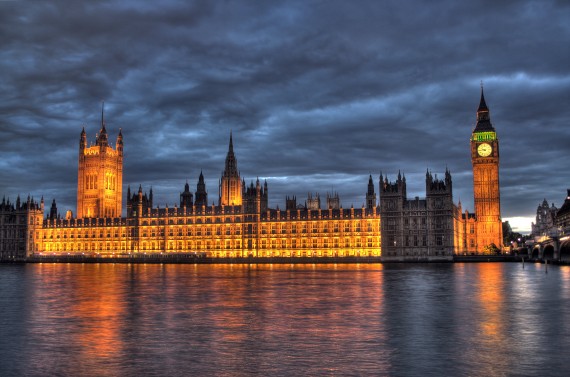

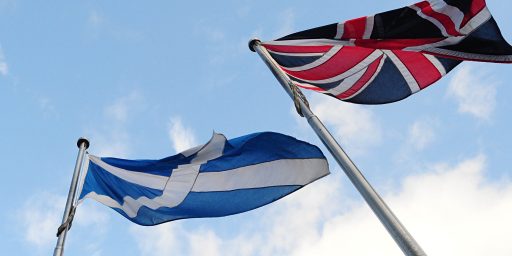
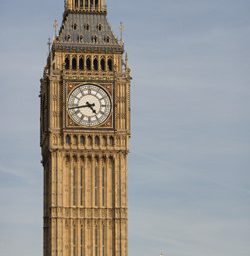
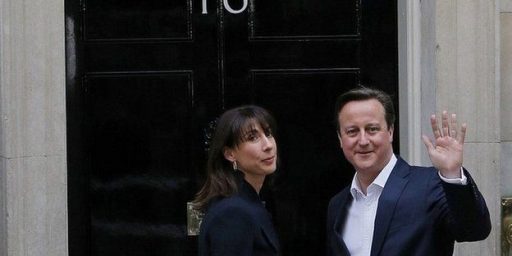
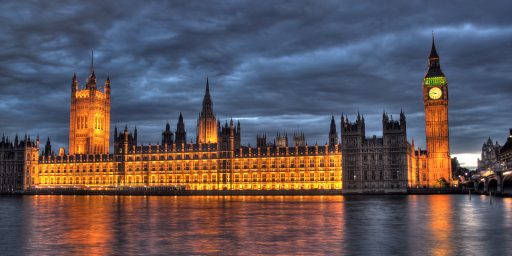
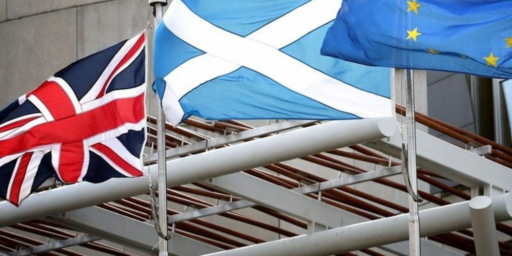
Thank you for the explanation; I’d followed somewhat but learned a good deal here.
At least theoretically, a minority government is also possible.
Yup, thanks for the coverage, it is enlightening. By the way, that’s a beautiful stock photo with the clouds like that.
Any chance the Official Monster Raving Loony Party makes an appearance? They always are fun to watch.
I’m sure British tabloids turning politics into one slug versus another hasn’t at all abetted the rise of these outsiders.
@Moosebreath:
They are running for a few spots and here’s a link to their video manifesto at the Telegraph.. I’d vote for them.
@Steven L. Taylor:
Theoretically, yes. And perhaps that will be what either Labour or the Tories attempt if they can’t form a coalition. But, that too would likely be weak and short-lived.
@Doug Mataconis: Well, you will notice that Milliband while he has ruled out a coalition with the SNP has not ruled out a governing agreement (i.e., a Labour minority government with SNP support, but not in a formal coalition). Such arrangements happen with more frequency in parliamentary systems than you might think (although it certainly would be unusual for the UK, but then the UK has moved into new territory of late).
Also, the Fixed-Term Parliaments Act of 2011 makes a quite dissolution not especially likely (but certainly still possible).
(Really, given the way the vote is shaping up I am not sure how there can be anything other than a minority government. And, further, it is unclear how the Tories can form that government, even if they end up with the most seats).
I have mixed feelings about the fixed-term legislation. On the one hand, I do consider it a problem when the a Prime Minister can time elections to his or her advantage (see Abe, Shinzo). On the other hand, it’s a benefit of the parliamentary system that an unstable parliamentary situation can be addressed*.
Which it still can in the UK, with a no-confidence vote. Which was why I didn’t think that this change would result in a five-year minority government or something similarly unstable. But if @Steven L. Taylor sees that (presumably because the bar for a no confidence vote higher than I had estimated)… I am more sour on the idea than I was.
* – Also, as my coblogger Prof Hanley points out, non-fixed elections can prevent the sort of elongated election season we’re seeing here and now. (On the other hand, a lot of that is the primary season, while in parliamentary systems the leaders are already chosen (albeit subject to change).
@Trumwill: Five years is a long time, to be sure. Mostly I am not seeing what Doug was predicting in his comment, i.e., an extremely short term minority government.
I think part of what we are seeing is the fact that new parameters are in place for UK politics and that the parties have not fully adapted as yet (for example: the treatment of a hung parliament as an oddity or coalitions as too weird to have to regularly deal with).